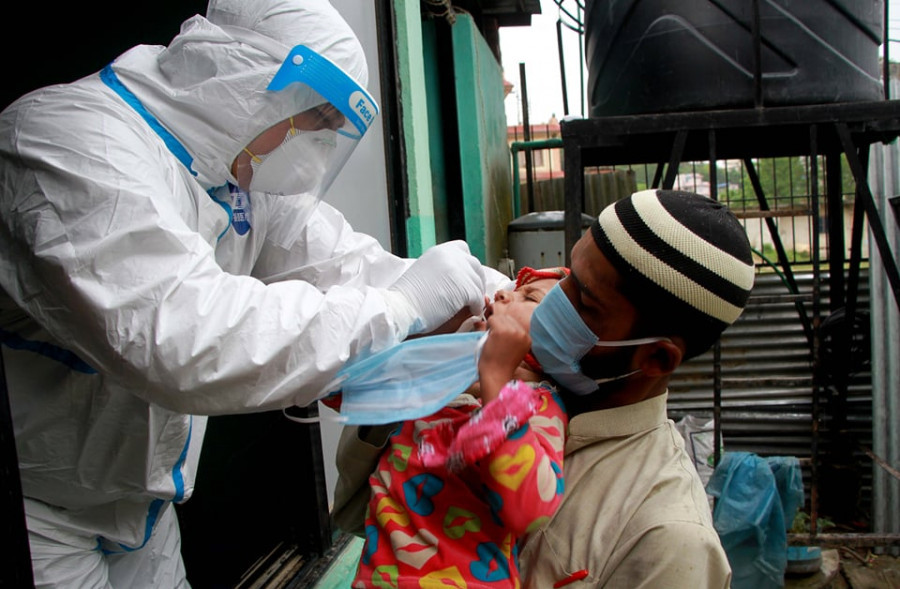Health
After rolling back free testing and treatment, officials not responding to distress calls
Over two dozen Covid-19 patients died at home due to inability to get hospital beds, health workers complain officials forwarded call of hotline number.
Arjun Poudel
The health condition of a 38-year-old Covid-positive man from Kuleshwor Kathmandu, who was in home isolation, deteriorated fast on Wednesday. His family members as well his doctor, tried to find a hospital bed for him the whole day.
“We contacted all hospitals treating Covid-19 patients in Kathmandu for a bed. But to no avail,” Dr Suyash Timalsina told the Post. “We kept trying to contact officials through the Ministry of Health’s hotline for serious cases. But they didn’t help.”
Timalsina had referred his patient to a hospital after the oxygen saturation level in his bloodstream was low. “The patient just needed oxygen therapy, but we had to struggle for the whole day until we found a bed at Bir Hospital in the evening. Officials have even stopped responding to calls on the hotline numbers.”
The Ministry of Health and Population on Sunday enforced the Cabinet decision dated October 5 to make patients pay (except for the poor, single women, disabled, senior citizens above 70 years, frontline health workers, security personnel and cleaning staffers) for Covid-19 tests and treatment. State-run laboratories stopped free tests last week and health workers assigned to carry out contact tracing have stopped collecting specimens—nasal and throat swabs for polymerase chain reaction tests.
After halting free test, trace and treatment, the government has also given up managing hospital beds for serious cases. This is serious negligence and an extreme form of irresponsibility on the part of the government, health experts say.
The ministry, which had been operating a hotline number to assist patients find hospital beds and ventilators, stopped picking up a few days ago, doctors as well as relatives of patients complained.
“Officials might have stopped responding, after a surge in infections and serious cases,” an official at the ministry told the Post. “As there are no beds available for new patients, it is easy not to respond to calls and to listen to them plead for a bed.”
So far over 30 people have died at home for lack of a hospital bed. Doctors say that even if the authorities concerned can’t do anything more for the people, they should take the initiative to arrange general beds and oxygen therapy.
“There are dozens of hospitals and medical colleges in the Kathmandu Valley,which do not have sufficient patients,” Dr Prabhat Adhikari, an infectious disease and critical care expert, told the Post. “If those facilities can be used for treatment of patients infected with coronavirus by arranging oxygen supply a lot of lives can be saved.”
Doctors say that oxygen therapy is a primary treatment for patients infected with coronavirus, if their oxygen level declines or they suffer from breathing difficulties.
The World Health Organization too said that oxygen therapy is a major treatment intervention for patients with severe Covid-19. “All countries should work to optimise the availability of pulse oximeters and medical oxygen systems,”the UN health agency said. “Mortality in those with critical illness has been reported as over 50 percent, thus implementation of proven critical care interventions such as lung protective ventilation should be optimized.”
So far, 148,509 people throughout the country have been infected with coronavirus, with 812 deaths, as of Thursday. According to the ministry, in the last 24 hours, 3,637 people tested positive with 21 deaths. Of the total new infections, 1552 were reported in Kathmandu Valley, according to the ministry.
The number of active cases stands at 44,877 as of Thursday.
Ministry estimates suggest that the country will record an additional 320,000 cases in the next four months in the “worst case scenario”. The number could go up to as high as 148,000 new cases in the “moderate case scenario”.
With the new cases starting to spike at a rapid pace, thousands of infected patients have been compelled to stay in home isolation risking their lives.
“Even if we can’t do much, we can set up oxygen supply facilities, which have been proven to be very effective, '' Dr Sher Bahadur Pun, chief of the Clinical Research Unit at the Sukraraj Tropical and Infectious Disease Hospital, told the Post. “A lot of deaths can be avoided if we provide at least oxygen therapy to those suffering from breathing difficulties.”
Meanwhile, several attempts to contact ministry officials to inquire about the hotline numbers did not succeed .




 14.24°C Kathmandu
14.24°C Kathmandu















